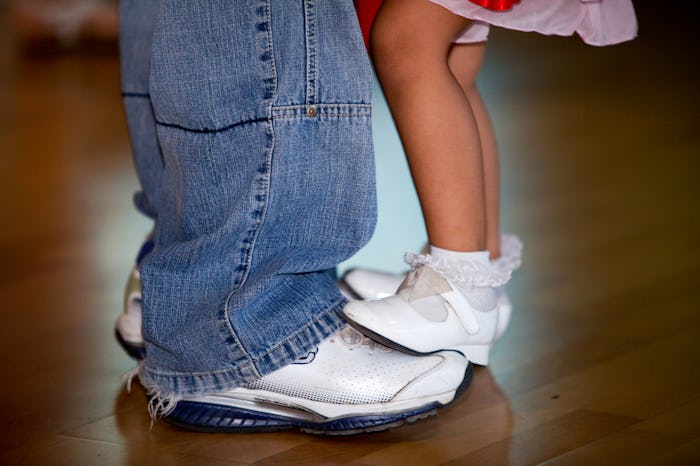News

Schools Are Canceling "Daddy Daughter Dances" & Parents Have A Lot Of Mixed Emotions
"Daddy Daughter Dances" at schools have recently become more and more controversial, but changing the gendered culture around them might be more difficult than some people think. Because of a recent law passed by the Department of Education in New York City, public schools have to hold only gender neutral events unless there is a very specific educational purpose and are open to all caregivers, despite the gender. But when a Staten Island school cancelled their "daddy daughter dance" this Friday, residents were not pleased at all, forcing the school to rollback their decision and hold the event anyway, with a updated guidance that it was open to everyone.
According to NBC New York, there are three other schools that still have a "daddy daughter dance" on their calendars, in spite of the regulation.
The gender neutral law from the DOE is supposed to make events more inclusive and guarantee that no one feels left out, but some Staten Island residents felt like its just "political correctness" gone wrong.
Raul Mejia, told the New York Post that taking his 5-year-old daughter to the dance was important to him. He said, "They’re trying to take away from the dads, from the good fathers. … It’s all political now." The father added, "I want to start her young, so she can know how a guy is supposed to treat her.”
Staten Island Assemblywoman Nicole Malliotakis plans on petitioning the DOE to change the rules in the Transgender and Gender Nonconforming Student Guidelines for the district. She told SILive:
"These guidelines are not only unclear, but have resulted in long-standing events such as father-daughter dances being eliminated. The DOE's policy is so overreaching that any activity considered a gender-related practice stands to be eliminated.
She added, "If the rule continues to be implemented as is, schools will have to cancel events such as mother-son bowling or game night as well. Should a transgender child wish to participate in such an event, accommodations can be made without having to eliminate the activity as a whole."
But if all people are worried about is that events are going to be cancelled, what's wrong with changing the names of the events to make them more inclusive. Can't a bowling night just be "Bowling Night" without having to specify a gender or a parent? It's not just about transgender kids, either. Events like these have long alienated kids from divorced parents or of same sex marriages. Calling it a "daddy daughter night" doesn't really feel like a safe space for a young girl who just happens to have two moms. How do they fit in?
Along with being exclusive, these kinds of events also reinforce what many people believe to be dangerous heteronormative gender roles, such as Mejia feeling that it is up to him to show his 5-year-old how a man "should treat her." Teaching his daughter to have respect for herself and a sense of self worth that will allow her to advocate herself in romantic relationships is essential. But is mimicking a "date night" between a father and daughter the right way to do that?
And why is that these events always involve the young girls dressing up like a princess to be taken out by their OG Prince Charming and learn how to "date," while moms and sons get to go bowling or do something that's not entirely related to teaching her that a woman's role is to be courted?
Then again, for every person who finds the whole concept of "daddy daughter dates" totally icky, there's another who thinks they're totally wholesome. Just like all those Staten Island residents who felt like it was reverse discrimination to cancel the dance. Hopefully, parents and schools can come up with a way to make sure that there are meaningful activities for families to do together without alienating each other. Which is all the gender neutral guidelines were supposed to do anyway.
Check out Romper's new video series, Bearing The Motherload, where disagreeing parents from different sides of an issue sit down with a mediator and talk about how to support (and not judge) each other’s parenting perspectives. New episodes air Mondays on Facebook.